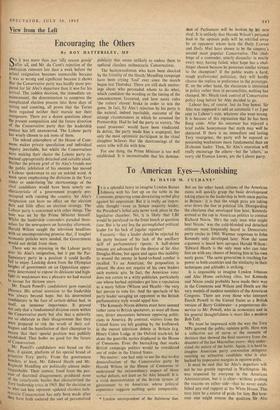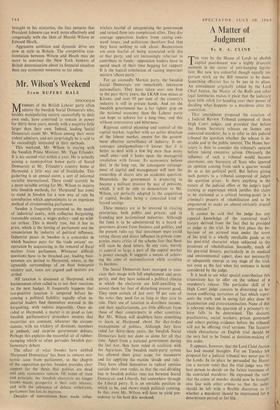To American Eyes—Astonishing
By DAVID M. CULHANE*
'r is a splendid fancy to imagine Lyndon Baines Johnson with his feet up on the table in the Commons, preparing some devastating verbal ploy against his opposition. But it is really an impos- sible thought—even as Senate majority leader, the President's lethal acts never took place in the legislative chamber. No, it is likely that LBJ would be paralysed on the front bench at question time. But is he any less the accomplished political leader for his lack of jugular repartee?
Fantastic—that a leader should be rejected by his party because of his lack of the ancillary skill of parliamentary riposte. A half-dozen reasons are advanced for the demise of Sir Alec Douglas-Home, but again and again this inability to wound the enemy in hand-to-hand combat is recalled. To an American, the proposition is absurd. He does not require of his own leaders such esoteric arts. In fact, the American voter does not cotton to a witty politician, particularly one whose barbed rejoinders get him a reputation as a nasty fellow (Wilson and Heath)--the very last person to vote for. And the spectacle of his party leader savaging an opponent in the British parliamentary style would appal him.
The Kennedy-Nixon debates must have seemed rather tame to British spectators, as must all those rare, direct encounters between opposing politi- cians in America. By contrast, visitors from the United States are left gasping by the knifework in the merest television debate in Britain (e.g. Henry Cabot Lodge at the Oxford teach-in), let alone the guerrilla tactics displayed in the House of Commons. Even the barracking that marks British campaign politics would be considered out of order in the United States.
No matter : one had only to see the day-to-day demoralisation of the Conservative party by Harold Wilson in the House of Commons to understand the extraordinary impact of those verbal defeats, not least on Sir Alec himself. It is a vivid demonstration of the British system of government to an American, whose political experience suggests nothing quite comparable.
* London correspondent of the BaltImore Sun.
But on the other hand, citizens of the American states will quickly grasp the basic development taking place in the leadership in both main parties in Britain: it is that the tough guys are taking over down the line in political life. Disregarding the charisma that enveloped him later, Kennedy arrived at the top in American politics to combat Richard Nixon. 'He's the only man who might beat Nixon,' was the cold-blooded and detached estimate most frequently heard in Democratic party circles in 1960. Warmer responses to John Kennedy only developed later. Now the same argument is heard here apropos Harold Wilson: `Edward Heath is the only man who can take him on with any chance of beating him at his own nasty game.' The same generation is reaching for power in both countries and the similarity in their techniques and attitudes is striking.
It is impossible to imagine Lyndon Johnson and Alec Home switching roles, but Kennedy and Nixon could probably have made their way in the Commons and Wilson and Heath are the very models of modern members of the American Congress. There are even those who interpret Enoch Powell to the United States as a British version of Barry Goldwater—a preposterous dis- service to Mr. Powell, who in economics and in his general thoughtfulness is more like a modern Bob Taft.
We must be impressed with the way the Tory MPs ignored the public opinion polls. Here was a collective act of nerve at the moment of decision that showed the final recovery from the disasters of the last Macmillan years—they under- stand the nature of the battle. Again, it is hard to imagine American party convention delegates resisting an attractive candidate who is also backed by impressive margins in opinion polls.
It must be said that Sir Alec's departure will not be too greatly regretted in Washington. He was respected by everyone in the American Administration, but it is clear—without probing the reasons on either side—that he never estab- lished any real rapport at the White House. This may later be a source of pride for him. But how- ever one might esteem the qualities Sir Alec
brought to his ministries, the fact remains that President Johnson can work more effectively and congenially with the likes of Harold Wilson or Edward Heath.
Aggressive ambition and dynamic drive are now in style in Britain. The competitive con- frontation between Wilson and Heath may Rio more to convince the New York bankers of British determination about its financial situation than any economic measures so far taken.





























 Previous page
Previous page